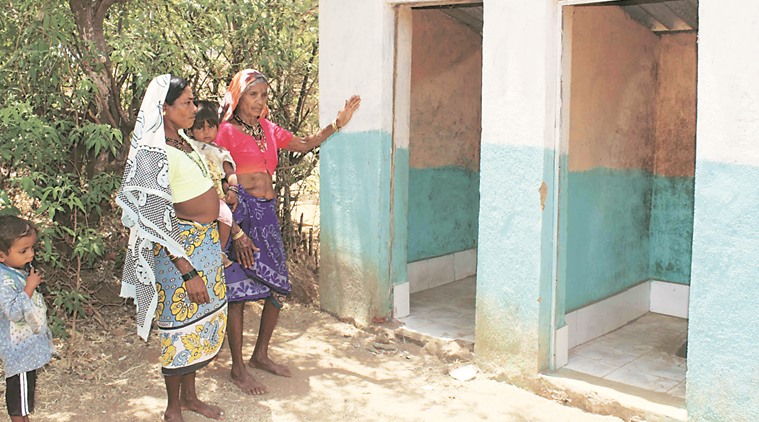Stay updated with the latest - Click here to follow us on Instagram
Palghar Bypoll: In Mokhada’s villages, many toilets built but never used
The gram panchayat in Asegaon says there is little they can do. Requesting anonymity, one office bearer says, “Our first priority is to ensure drinking water for everyone. We are fighting one battle at a time.”
 Several villagers say they continue to defecate in open fields. Deepak Joshi
Several villagers say they continue to defecate in open fields. Deepak Joshi
Buddhi Bai Bhogade (84) has a daily early morning task. She has to wake her grandson, Nanu (3), and ensure that he is out in the fields early. Bhogade, a resident of Dapti village in Mokhada taluka of Palghar, has a toilet that she shares with her neighbours, but neither the neighbours nor the Bhogade family ever used it. The reason is simple, there is not enough water to drink, so water can hardly be expended on cleaning the toilet.
While Maharashtra Chief Minister Devendra Fadnavis, in April this year, declared rural Maharashtra Open Defecation Free (ODF), residents of several villages in Mokhada, nearly 170 km from Mumbai, say they continue to defecate in the fields. “There are toilets in all these villages. Several people built individual toilets, while some houses share one. Toilets came, but the water never did,” says local social worker Devram Vaje.
“So many toilets have never been used even once. While some people started using them, they realised that a lot of water is needed. Some now use the toilets as an extra shed to keep their livestock or to stock household items.” In Asegaon, over 80 houses have toilets. “There are over 200 families living here. Nobody uses these toilets,” says Pandu Dhondage (50), a resident. “There is water shortage throughout the year, and it becomes unbearable in summers. The government provides tanker water, but just one tanker in two days is not enough for 200 families. Family feuds crop up over water here. Who then will waste water?” he asks.
Just beyond the periphery of the village lies a field that villagers use as their open air toilet. “Early mornings, the field is for men and children. Women are allowed on the field only after the men have gone to work. After dusk falls, we don’t have any option but to hold it in. In case there is an emergency, only a group is allowed outside,” says Asha Nijne (27), a housewife. She laughs, “Only animals are allowed these bodily functions at will, anywhere.”
The same is true for Dapti and Bhowadi, two nearby villages. “In Bhowadi, we have different fields for men and women. While men go downhill, towards the open field, women go towards the trees,” says Dheku Dhenge (32), a resident. A closed medical centre also serves as a shade for the women. “Several older women who can’t walk very far sit behind the medical centre. They take the little children too,” he explains. Many villagers admit there’s not enough water to wash themselves afterward, “We either use leaves or cloth,” says one young girl in Dapti.
The gram panchayat in Asegaon says there is little they can do. Requesting anonymity, one office bearer says, “Our first priority is to ensure drinking water for everyone. We are fighting one battle at a time.” Block Development Officer Pramod Godambe refuses to comment on the matter too.
Maharashtra’s Minister for Tribal Affairs and also the local Member of Legislative Assembly Vishnu Savra says he will look into the problem.
“I cannot comment right now because of the impending elections,” he told The Indian Express.
The villagers are unhappy that the state has been declared ODF while their ground reality says otherwise. “Unless they solve our basic issues, we can’t use the toilets. It is very easy to blame the village mentality, but even we don’t want to live like this,” says Vaje.







